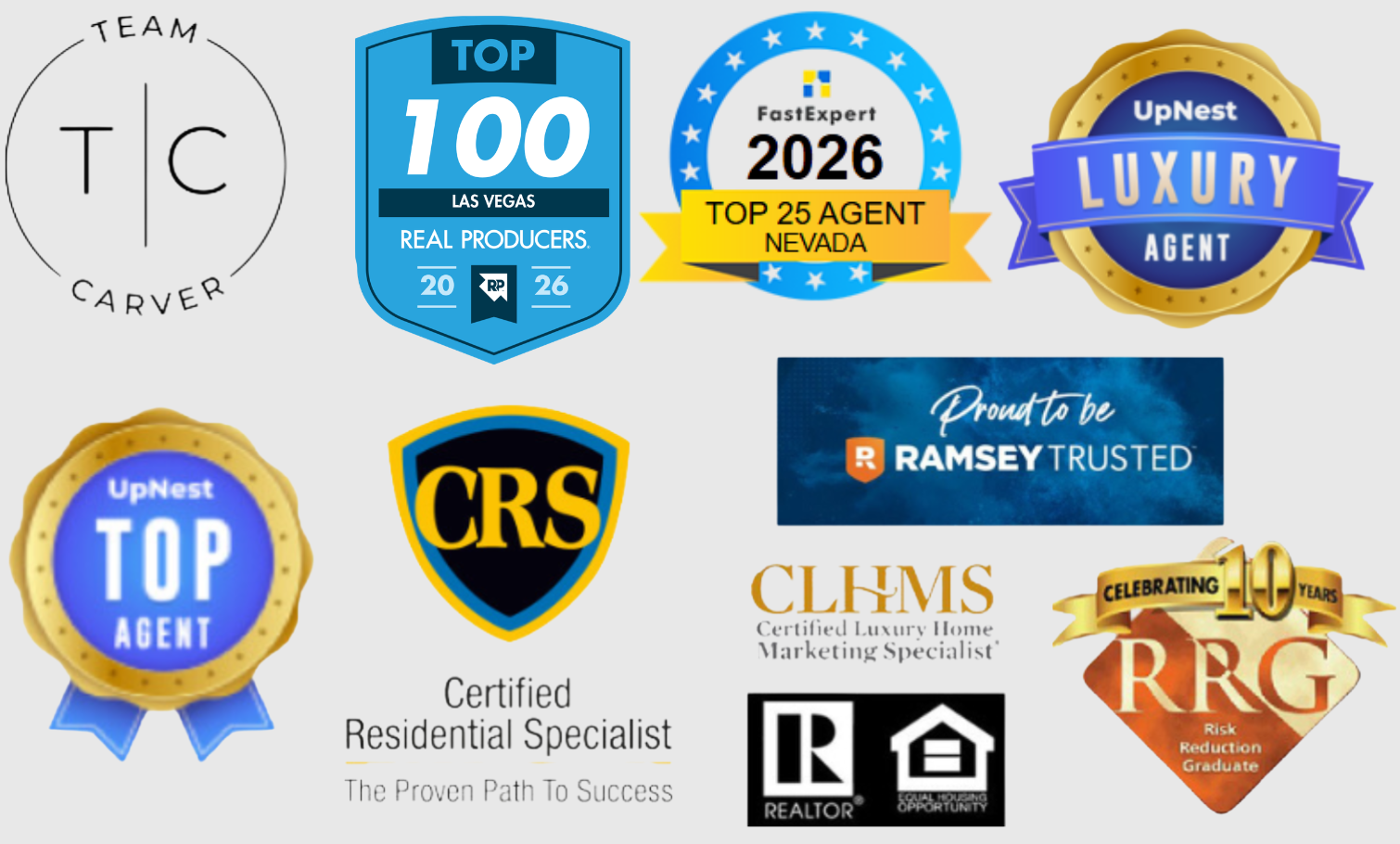Buying in Las Vegas – HIDDEN COSTS
Imagine finding your dream home in Las Vegas, only to discover that hidden fees could push it beyond your budget. Let’s dive into what these costs are to make sure this doesn’t happen to you.
When considering a move to Las Vegas, it’s important to understand the potential for high closing costs. These costs cover a range of fees and expenses necessary to finalize a real estate transaction.
Closing costs typically include loan origination fees, title insurance, escrow fees, and several others. In Las Vegas, closing costs can be particularly high due to several factors. Rising property values have led to higher loan amounts and associated costs. Also, high interest rates have an impact as buyer are often paying points to buy down the rate.
Let’s start with loan fees: There is a Loan origination fee that the lender charges for processing your loan application which can range from 1/2% to 1% of the loan amount. For a $300,000 loan, this means $1,500 to $3,000.
Appraisal: Most lenders will require an appraisal to be completed for the home as part of the loan process. This is commonly a buyer fee and costs around $500 to $1000.
Escrow fees: cover the escrow company’s services and are commonly split 50/50 between the buyer and seller, they usually range from $500 to $2,500 for each party. Title insurance protects against losses due to title defects and generally costs between $1,000 and $3,000, depending on the property’s value.
Home inspection cost: Upon acceptance the Buyer will have a due diligence period which is the time frame to complete inspections. Home inspections run around $400 to $1,000.
A general rule of thumb is that buyer closing costs when obtaining a loan are around 3% of the sale price but can be more if buying down interest rates or paying other fees.
Commission: Buyer agents are now required to have a buyer sign a buyer brokerage which will address commission fees that the buyer pays. This can be offset by negotiating with the seller to pay for the buyer agent commission. However, it is negotiable. So, the buyer may be responsible to pay some or all of the buyer agent commission.
Property tax after Closing: While Las Vegas offers relatively moderate property tax rates compared to other major cities, be mindful of potential increases following reassessment. This is specifically a concern for new home construction as the tax rate would have been previously based on the land. Once the new home closes escrow, property taxes will be increased to reflect the updated value. Higher property taxes can impact monthly mortgage payments if taxes are escrowed, and they can affect the overall affordability of a home.
Now, let’s talk about HOA fees and special assessments, which are common in many Las Vegas communities.
Homeowners Association (HOA) fees are regular dues paid by residents in a community to cover landscaping, community gate or pool maintenance, security services and upkeep of shared spaces like parks and clubhouses.
The range of HOA fees can vary widely depending on the community and the amenities offered. On average, you might expect to pay anywhere from $100 to $300 per month. However, in luxury communities with extensive amenities, fees can go up to $500 or more per month. Additionally, some master planned communities have a master and sub association fee. I know of a couple of communities that have 3 HOA’s with separate fees. If you are considering a high rise, the fees can be very expensive but do include some of the utility bills such as the water bill.
Another thing to keep in mind is the potential assessments an HOA may levy on all the homeowners. My neighborhood changed the grass out in common areas to a more desert friendly landscaping. They have had to add an assessment to all the homeowners for this cost. It is important that if you are looking to purchase a condo or Highrise that you research the HOA reserves and potential assessment. I know of condo community that recently replaced all the roofs and the cost is being spread among all homeowners. This can be a huge expense.
Some HOA’s charge a new member fee at close of escrow. This is common in the Sun City communities. The fee is negotiable but often the Seller will request the buyer to pay it. In Sun City Anthem the fee is 1/3 of 1% of the sale price. This is easily several thousand dollars that a buyer needs to pay at close of escrow.
Now on to utility costs and efficiency considerations, which are also important factors when buying a home in Las Vegas.
Utility costs in Las Vegas can vary, but it’s crucial to be aware of a few key areas, particularly water and power. Due to the desert climate, water usage can be high, especially for landscaping. Water rates can range depending on usage and the local water district but expect to pay around $100 to $300 per month for an average household.
Electricity costs can also be significant, especially during the summer months when air conditioning is essential. The average monthly electric bill in Las Vegas is about $100 to $150, but during peak summer months, it can rise to $500 or more depending on the size and efficiency of your home.
The efficiency of a home’s HVAC and plumbing systems can greatly impact these utility costs. Homes with modern, energy-efficient HVAC systems can keep your electric bills lower, even during the hot summer months.
Another aspect to consider is insulation and window quality. Proper insulation and energy-efficient windows can help maintain a consistent indoor temperature, reducing the strain on your HVAC system and lowering electricity costs. Many of our homes have dual windows, which helps a lot. I do see some older homes with only one windowpane, and I recommend replacing these windows!
Plumbing efficiency is also important. Homes with low-flow fixtures and well-maintained plumbing systems will help reduce water usage and keep your water bills manageable. Additionally, consider homes with desert-friendly landscaping, which requires less water and can further reduce your water costs. We just replaced our front yard landscaping to desert landscaping which has helped reduce our water bill.
While utility costs in Las Vegas can be higher due to the climate, choosing a home with efficient HVAC and plumbing systems, good insulation, and energy-efficient windows can help manage these expenses. It’s a good idea to assess the efficiency of these systems when considering a property to ensure it aligns with your budget and sustainability goals.
Now, let’s talk about maintenance and repair costs, which are crucial to consider when buying a home in Las Vegas.
A thorough home inspection is vital. Skipping or overlooking this step can lead to significant repair costs after the close of escrow. A detailed inspection will uncover any existing issues with the home, giving you a clear picture of its condition before you buy.
Common repairs in Las Vegas homes often stem from the hot climate. The intense heat can put a strain on HVAC systems, leading to frequent repairs or even replacements. Regular maintenance of your HVAC system is essential to ensure it operates efficiently and lasts longer. This might include replacing filters, cleaning ducts, and checking for refrigerant leaks.
Roofing is another area that requires attention. The strong sun and occasional monsoon rains can cause wear and tear on roofs. It’s important to check for signs of damage, such as missing or cracked tiles, and ensure proper drainage to prevent leaks and water damage. I see cracked roof tiles on almost every home inspection report!
Plumbing issues can also be common due to the high mineral content in the water, which can cause buildup and corrosion in pipes. Regular inspection and maintenance of plumbing systems can help prevent costly repairs and water damage.
Additionally, homes with extensive landscaping may face higher maintenance costs. In the desert climate, it’s crucial to maintain irrigation systems and choose plants that are suitable for low-water environments to keep landscaping costs down.
Investing in a home inspection can save you from unexpected repair costs and give you leverage during price negotiations. It also allows you to budget for necessary repairs and maintenance, ensuring your new home remains in good condition.
While maintenance and repair costs are an inevitable part of homeownership, being proactive with inspections and regular upkeep can help manage these expenses. Understanding common repair needs in Las Vegas homes will prepare you for potential issues and help you make informed decisions during the home-buying process.
I also recommend having a home warranty. A home warranty provides coverage for the repair or replacement of major home systems and appliances that may fail due to normal wear and tear. The home warranty covers items such as heating, plumbing and electrical. Costs are around $500 to $1,000 and cover the home for a year after the close of escrow. The cost is negotiable, I see around 70% of the time where a buyer asks the seller to pay for the fee.
Adequate cash reserves can also come in handy if you need to cover the cost of unexpected repairs that your insurance won’t cover, or that is insufficient to meet the policy deductible.
I am a big Dave Ramsey fan. Most experts, like Dave recommend having at least three to six months of core household expenses in an emergency fund. If you don’t have this amount in reserves on hand before buying a home, focus on building up your cushion sooner rather than later to avoid the risk of foreclosure if life happens and your income is suddenly reduced.




